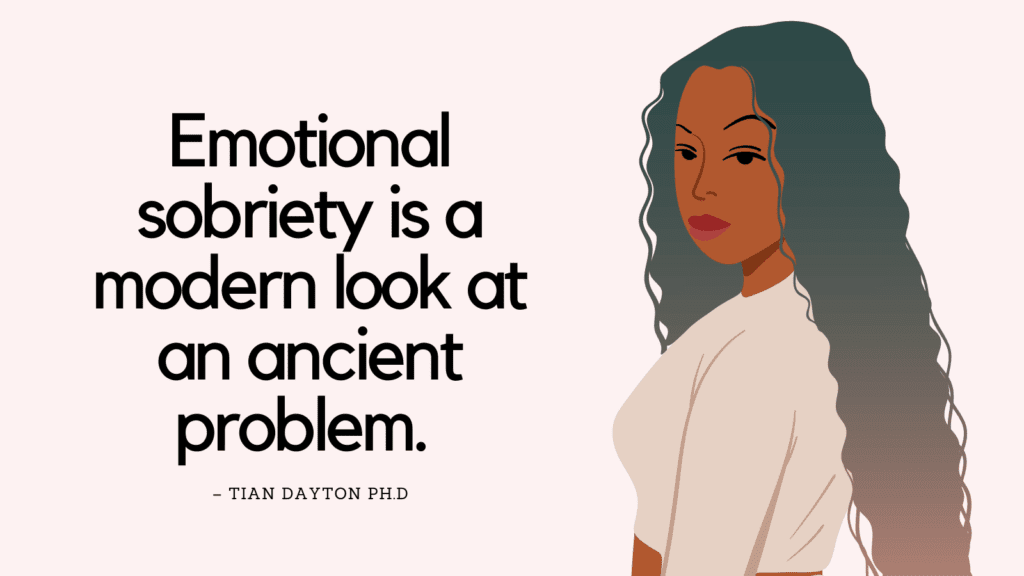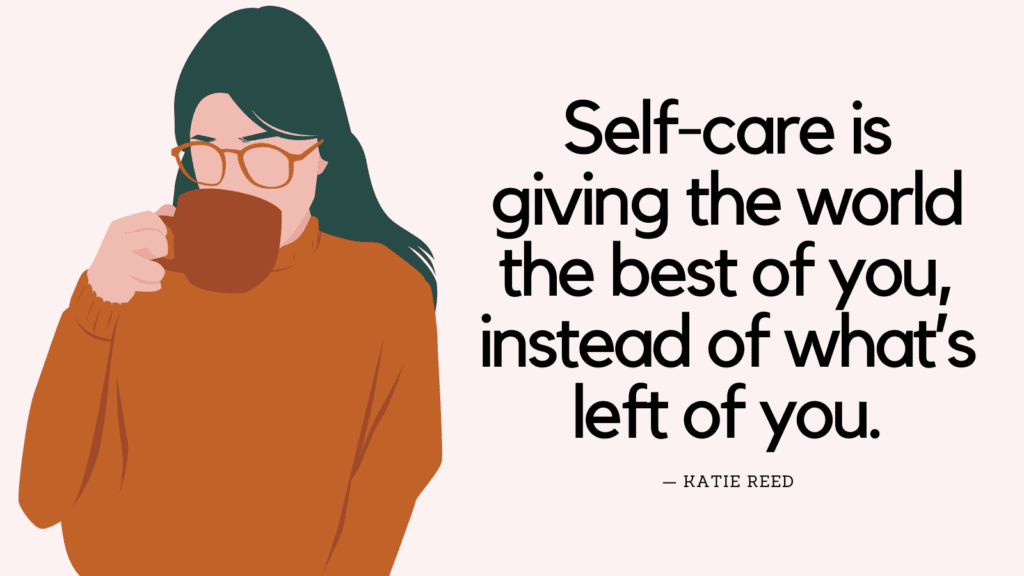This post contains some of the best emotional sobriety quotes
What Is Emotional Sobriety?
Emotional sobriety refers to the ability to handle life’s challenges and stressors in a healthy and balanced way, without relying on drugs, alcohol, or other addictive behaviors to cope with emotions.
It involves being able to experience a range of emotions without being overwhelmed by them, and being able to respond to those emotions in a constructive way that promotes growth and well-being.
Emotional sobriety is not just about abstaining from addictive substances or behaviors, but also about developing healthy coping mechanisms and emotional intelligence.
This can include cultivating self-awareness, practicing mindfulness, developing healthy relationships, and learning to manage stress in a healthy way.
People in recovery from addiction often strive for emotional sobriety as part of their overall healing and growth process.
However, emotional sobriety is not limited to individuals with a history of addiction – anyone can benefit from improving their emotional health and building resilience in the face of life’s challenges.
Emotional Sobriety Quotes
1. “The ability to self-regulate, to bring ourselves into balance, is key to emotional sobriety.” – Tian Dayton Ph.D
2. “The essence of emotional sobriety is good self-regulation. It means that we have mastered those mind/body skills that allow us to balance our moods, nervous systems, appetites, sexual drive, and sleep, and that we’ve developed the ability to experience our inner worlds without running from them so that we can come to understand what makes us tick.” – Tian Dayton Ph.D
3. “Emotional sobriety also means that we have learned how to tolerate our intense emotions without acting out in dysfunctional ways, clamping down and foreclosing on our feeling world, or self-medicating.” – Tian Dayton Ph.D
4. “Good emotional sobriety reflects a well-balanced limbic system. The limbic system is the mind/body system that governs our mood, emotional tone, appetite, and sleep cycles, to name just a few of its wide-ranging functions.” – Tian Dayton Ph.D
5. “Part of emotional sobriety lies in learning how to live with and manage a certain amount of stress, ambivalence, fear, anxiety, and disappointment, and how to temper those emotions and feelings with love, acceptance, productivity, and community.” – Tian Dayton Ph.D
Related: How To Stop Bad Habits And Addictions?
6. “Emotional Sobriety is for people who are trying to live a balanced life or attempting to understand what relationship trauma is all about.” – Tian Dayton Ph.D
7. “Emotional sobriety is a modern look at an ancient problem.” – Tian Dayton Ph.D
8. “The challenge of emotional sobriety is to learn to seek and respect moderation and to value the experience of being poised in flight from where we can see clearly in all directions, from where we can steer a fruitful path and respond to the elements without being unnecessarily overtaken by them.” – Tian Dayton Ph.D
9. “Emotional sobriety encompasses our ability to live with balance and maturity. It means that we have learned how to keep our emotions, thoughts, and actions within a balanced range.” – Tian Dayton Ph.D
10. “Emotional sobriety is about finding and maintaining our emotional equilibrium, our feeling rheostat, the one that helps us to adjust the intensity of our emotional responses to life.” – Tian Dayton Ph.D
11. “Emotional sobriety is tied up in our ability to self-regulate and to bring ourselves into and maintain our balance.” – Tian Dayton Ph.D
12. “At the core of emotional sobriety is the ability to bring our emotions into balance so what we’re feeling is within a manageable range.” – Tian Dayton Ph.D
Related: How To Achieve Emotional Sobriety? (+FREE Emotional Sobriety Worksheets)
13. “Emotional sobriety is a term originally introduced by Bill Wilson who, along with others, began Alcoholics Anonymous (AA). In his own words he describes what he sees as the next frontier for recovery, not only from addictions of all kinds but also from what lies in its wake. Sobriety is only the first step. “I think that many oldsters who have put our AA ‘booze cure’ to severe but successful tests still find they often lack emotional sobriety. Perhaps they will be the spearhead for the next major development in AA, the development of much more real maturity and balance.”” – Tian Dayton Ph.D
14. “An important part of emotional sobriety is the ability to think about what we are feeling, to translate emotions into words so that we can make sense of them, so that we can bring anxieties and fears into a more balanced place through reasoning them through.” – Tian Dayton Ph.D
15. “The ability to use our thinking minds to organize the feelings and sensory impressions fed to us through our limbic system is key to emotional sobriety.” – Tian Dayton Ph.D
16. “Our early experiences literally weave themselves into our neural systems, becoming a neural basis for self-regulation and emotional sobriety.” – Tian Dayton Ph.D
17. “Trauma affects the internal world of each person, their relationships, and their ability to communicate and be together in a balanced, relaxed, and trusting manner. It affects their emotional sobriety or ability to self-regulate.” – Tian Dayton Ph.D
18. “Not knowing what normal is can lead to emotional deregulation and problems with emotional sobriety. We lose our sense of what represents balanced “normal” behavior.” – Tian Dayton Ph.D
19. “To attain and maintain emotional sobriety, we need to learn to tolerate our strong feelings and translate those feelings into words.” – Tian Dayton Ph.D
Related: How To Step Out Of Denial? Top 10 Steps To Overcome Denial When The Truth Is Heartbreaking
20. “Compulsive self-medicating, whether with a substance or a behavior, represents a lack of self-regulation, a lack of emotional sobriety.” – Tian Dayton Ph.D
21. “Learning alternative methods for creating what we might call “natural highs” is key in turning addictive/compulsive behavior around and achieving emotional sobriety.” – Tian Dayton Ph.D
22. “Healthy ways of depending are part of emotional sobriety. Relationships are key to our emotional balance. Countless studies correlate strong relationship networks with physical health, reduced doctor visits, and longevity.” – Tian Dayton Ph.D
23. “Certainly taking care of ourselves is central to emotional sobriety, but is it the whole story and the whole solution?” – Tian Dayton Ph.D
24. “If we’re holding on to anger and resentment, it makes it harder to live in, attain, and maintain emotional sobriety.” – Tian Dayton Ph.D
25. “People with good emotional sobriety tend to avoid unnecessary conflict, but they do speak up where necessary.” – Tian Dayton Ph.D
Related: Am I Self-Destructive Quiz
26. “People with good emotional sobriety tend not to create unnecessary conflict in their lives; it is simply too costly to their own peace of mind. They understand that their inner peace is their responsibility, and that if they lose it, only they can get it back.” – Tian Dayton Ph.D
27. “People with good emotional sobriety take responsibility for maintaining their own good mood. They don’t blame other people for the mood they are in and they don’t wait for someone else to change before they let themselves feel better. They know that like attracts like” – Tian Dayton Ph.D
28. “Emotional sobriety describes a midrange of thinking, feeling, and behavior. Though at first blush the idea may seem as if we no longer experience highs and lows, this would be a limited idea of the scope of it. Emotional balance and maturity actually allow us tremendous freedom of inner movement because we’re no longer living in reactive mode.” – Tian Dayton Ph.D
Related: Impulsivity Test: Am I Impulsive?

References
- Portions of this article were adapted from the book Emotional sobriety, © 2007 by Tian Dayton Ph.D. All rights reserved.



